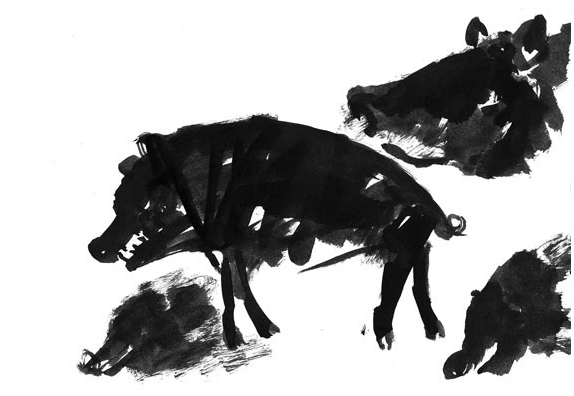Author’s note: Gajanan Madhav Muktibodh (13 November 1917 – 11 September 1964) was a Hindi poet, a literary critic and theorist, a short story writer, and a journalist who wrote extensively on the geopolitics of the period. A concerted Marxist throughout his life, he aspired both to comprehend the capitalist structure of social relations in its absolute totality and to militate against it in ways which were accorded to him by his intellectual praxes. This aspiration was accompanied by Muktibodh’s inevitable failure to fulfill it, which itself was accompanied by his militant recommencement of this aspiration. Where the poetic form failed him, Muktibodh recommenced his praxis at the level of short story; where the form of short story failed him, he recommenced his praxis at the level of literary criticism and theorization; and where literary criticism and theorization failed him, he recommenced his praxis at the level of analyzing the geopolitics of the period.
Muktibodh was a writer of long, very long poems. But his long poems did not simply constitute a formal choice on his part. The interminability of his poems was not owing to the poet-subject’s desire for self-expression. If he was unable to bring his poems to an end, it was only because, as he put it, history was itself a welter of ongoingness, constituted most fundamentally by the contradiction between buyers and sellers of labor-power. For him, the end of the poem was not simply a problematic of poetics or philosophy. It could not have been resolved either by developing a “Marxist” poetics or by innovating an “experimental” poetics. Instead, schematically put, the problematic of how to bring the poem to an end was, for him, a transcoding of how to bring history to a revolutionary standstill.
Thus understood, to bring the poem to an end would imply the end of the poem, quite literally. It would imply the abolition of the poem, or better still, an abolition of the historical division of labor along the lines of class, caste, and gender, to which his poetry, a “poet’s” vocation, owed its own existence. Muktibodh cognized that his poetry emerged from particular social struggles, and that while his poetry must clarify and hone the limits of these struggles in ways its formal resources allowed it to, its own redemption lay in—and only in—the absolute abolition of social exploitation and oppression.
Muktibodh’s poetics yields a phantasmic, surreal continuum of an affective experience of history, at once terrorizing and human, at once primordial and modern. His poetic language constitutes a vertiginous commingling of Sanskritized philosophies of body and spirit with subaltern vernaculars of Hindi and Marathi; he uses words from Arabic and Persian, while often plying words from English in ways that accentuate the jargon-like scientific, technological, and commercial overtones of the language. Marked by heavy enjambment and interplay of sounds, Muktibodh’s prosody is at once heraldic and lyrical. And throughout his oeuvre Muktibodh assigns these remarkable formal innovations the gargantuan task of disclosing the political, economic, and cultural unevennesses of a rapidly integrating capitalism in a newly independent India.
While he was little known in his own time, many have now come to consider Muktibodh to be one of the greatest Hindi poets. Over the past two to three decades his poetry has gained much in reputation and has come to be widely affirmed in Hindi literary circles. This is a testament to both the intensification of those social, political, and economic injustices which Muktibodh revolted against and the conjunctural relevance of his poetic praxis. The following fragment comes from a book-length experimental translation of one of Muktibodh’s short poems (121 lines), titled “To a Formless Void.”
The author wishes to thank Martand Pragalbha, Pothik Ghosh, and Pratyush Chandra, whose critical to-and-fro on Muktibodh’s poetics came to occasion this project.


